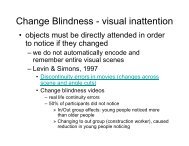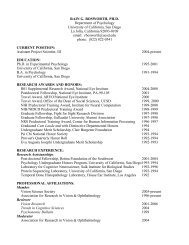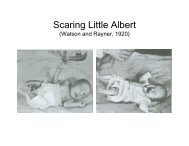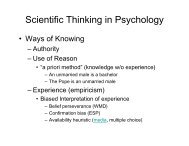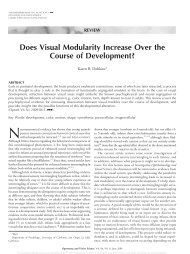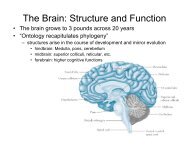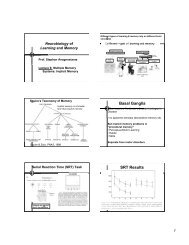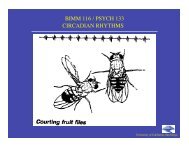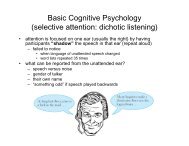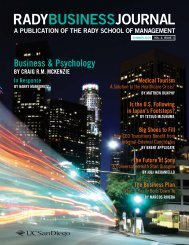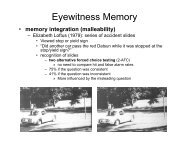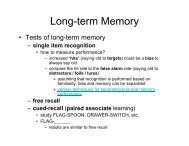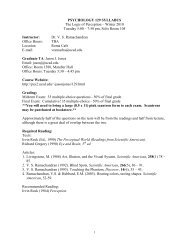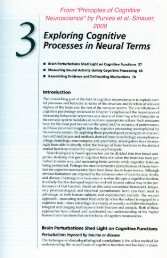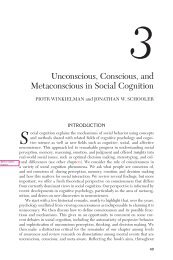Confirmation Bias: A Ubiquitous Phenomenon in Many Guises
Confirmation Bias: A Ubiquitous Phenomenon in Many Guises
Confirmation Bias: A Ubiquitous Phenomenon in Many Guises
You also want an ePaper? Increase the reach of your titles
YUMPU automatically turns print PDFs into web optimized ePapers that Google loves.
202 RAYMOND S. NICKERSON<br />
negative manner; from a logical po<strong>in</strong>t of view,<br />
they should have used potentially disconfirm<strong>in</strong>g<br />
test cases, but they failed to th<strong>in</strong>k to do so.<br />
Evans (1989) cited the results of several<br />
efforts by experimenters to modify hypothesistest<strong>in</strong>g<br />
behavior on derivatives of Wason's<br />
number-set task by <strong>in</strong>struct<strong>in</strong>g participants<br />
about the importance of seek<strong>in</strong>g negative or<br />
disconfirm<strong>in</strong>g <strong>in</strong>formation. He noted that although<br />
behavioral changes were sometimes<br />
<strong>in</strong>duced, more often performance was not<br />
improved. This too was taken as evidence that<br />
results that have been attributed to confirmation<br />
bias do not stem from a desire to confirm, but<br />
rather from the difficulty people have <strong>in</strong> th<strong>in</strong>k<strong>in</strong>g<br />
<strong>in</strong> explicitly disconfirmatory terms.<br />
Evans used the same argument to account for<br />
the results typically obta<strong>in</strong>ed with Wason's<br />
(1966, 1968) selection task that have generally<br />
been <strong>in</strong>terpreted as evidence of the operation of<br />
a confirmation bias. Participants select named<br />
items <strong>in</strong> this task, accord<strong>in</strong>g to this view,<br />
because these are the only ones that come to<br />
m<strong>in</strong>d when they are th<strong>in</strong>k<strong>in</strong>g about what to do.<br />
The bias that is operat<strong>in</strong>g is not that of want<strong>in</strong>g<br />
to confirm a tentative hypothesis but that of<br />
be<strong>in</strong>g strongly <strong>in</strong>cl<strong>in</strong>ed to th<strong>in</strong>k only of <strong>in</strong>formation<br />
that is explicitly provided <strong>in</strong> the problem<br />
statement. In short, Evans (1989) dist<strong>in</strong>guished<br />
between confirmatory behavior, which he acknowledges,<br />
and confirmatory <strong>in</strong>tentions, which<br />
he denies. The "demonstrable deficiencies <strong>in</strong> the<br />
way <strong>in</strong> which people go about test<strong>in</strong>g and<br />
elim<strong>in</strong>at<strong>in</strong>g hypotheses," he contended, "are a<br />
function of selective process<strong>in</strong>g <strong>in</strong>duced by a<br />
widespread cognitive difficulty <strong>in</strong> th<strong>in</strong>k<strong>in</strong>g<br />
about any <strong>in</strong>formation which is essentially<br />
negative <strong>in</strong> its conception" (p. 63). The<br />
tendency to focus on positive <strong>in</strong>formation and<br />
fail to consider negative <strong>in</strong>formation is regarded<br />
not as a conscious cognitive strategy but as the<br />
result of preattentive processes. Positive is not<br />
synonymous with confirmatory, but as most<br />
studies have been designed, look<strong>in</strong>g for positive<br />
cases is tantamount to look<strong>in</strong>g for confirmation.<br />
The idea that people have a tendency to focus<br />
more on positive than on negative <strong>in</strong>formation,<br />
like the idea of a confirmation bias, is an old<br />
one. An observation by Francis Bacon (1620/<br />
1939) can aga<strong>in</strong> illustrate the po<strong>in</strong>t: "It is the<br />
peculiar and perpetual error of the human<br />
understand<strong>in</strong>g to be more moved and excited by<br />
affirmatives than negatives; whereas it ought<br />
properly to hold itself <strong>in</strong>differently disposed<br />
towards both alike" (p. 36). Evans's (1989)<br />
argument that such a bias can account, at least <strong>in</strong><br />
part, for some of the phenomena that are<br />
attributed to a confirmation bias is an <strong>in</strong>tuitively<br />
plausible one. A study <strong>in</strong> which Perk<strong>in</strong>s et al.,<br />
(1983) classified errors of reason<strong>in</strong>g made <strong>in</strong><br />
<strong>in</strong>formal arguments constructed by over 300<br />
people of vary<strong>in</strong>g age and educational level<br />
supports the argument. <strong>Many</strong> of the errors<br />
Perk<strong>in</strong>s et al. identified <strong>in</strong>volved participants'<br />
failure to consider l<strong>in</strong>es of reason<strong>in</strong>g that could<br />
be used to defeat or challenge their conclusions.<br />
I will be surprised if a positivity bias turns out<br />
to be adequate to account for all of the ways <strong>in</strong><br />
which what has here been called a confirmation<br />
bias manifests itself, but there are many<br />
evidences that people f<strong>in</strong>d it easier to deal with<br />
positive <strong>in</strong>formation than with negative: it is<br />
easier to decide the truth or falsity of positive<br />
than of negative sentences (Wason, 1959,1961);<br />
the assertion that someth<strong>in</strong>g is absent takes<br />
longer to comprehend than the assertion that<br />
someth<strong>in</strong>g is present (Clark, 1974); and <strong>in</strong>ferences<br />
from negative premises require more time<br />
to make or evaluate and are more likely to be<br />
erroneous or evaluated <strong>in</strong>correctly than are those<br />
that are based on positive premises (Fodor,<br />
Fodor, & Garrett, 1975). How far the idea can be<br />
pushed is a question for research. I suspect that<br />
failure to try to construct counterarguments or to<br />
f<strong>in</strong>d counterevidence is a major and relatively<br />
pervasive weakness of human reason<strong>in</strong>g.<br />
In any case, the positivity bias itself requires<br />
an explanation. Does such a bias have some<br />
functional value? Is it typically more important<br />
for people to be attuned to occurrences than to<br />
nonoccurrences of possible events? Is language<br />
processed more effectively by one who is<br />
predisposed to hear positive rather than negative<br />
assertions? Is it generally more important to be<br />
able to make valid <strong>in</strong>ferences from positive than<br />
from negative premises? It would not be<br />
surpris<strong>in</strong>g to discover that a positivity bias is<br />
advantageous <strong>in</strong> certa<strong>in</strong> ways, <strong>in</strong> which case<br />
Bacon's dictum that we should be <strong>in</strong>differently<br />
disposed toward positives and negatives would<br />
be wrong.<br />
There is also the possibility that the positivity<br />
bias is, at least <strong>in</strong> part, motivationally based.<br />
Perhaps it is the case that the process<strong>in</strong>g of<br />
negative <strong>in</strong>formation generally takes more effort<br />
than does the process<strong>in</strong>g of positive <strong>in</strong>formation



